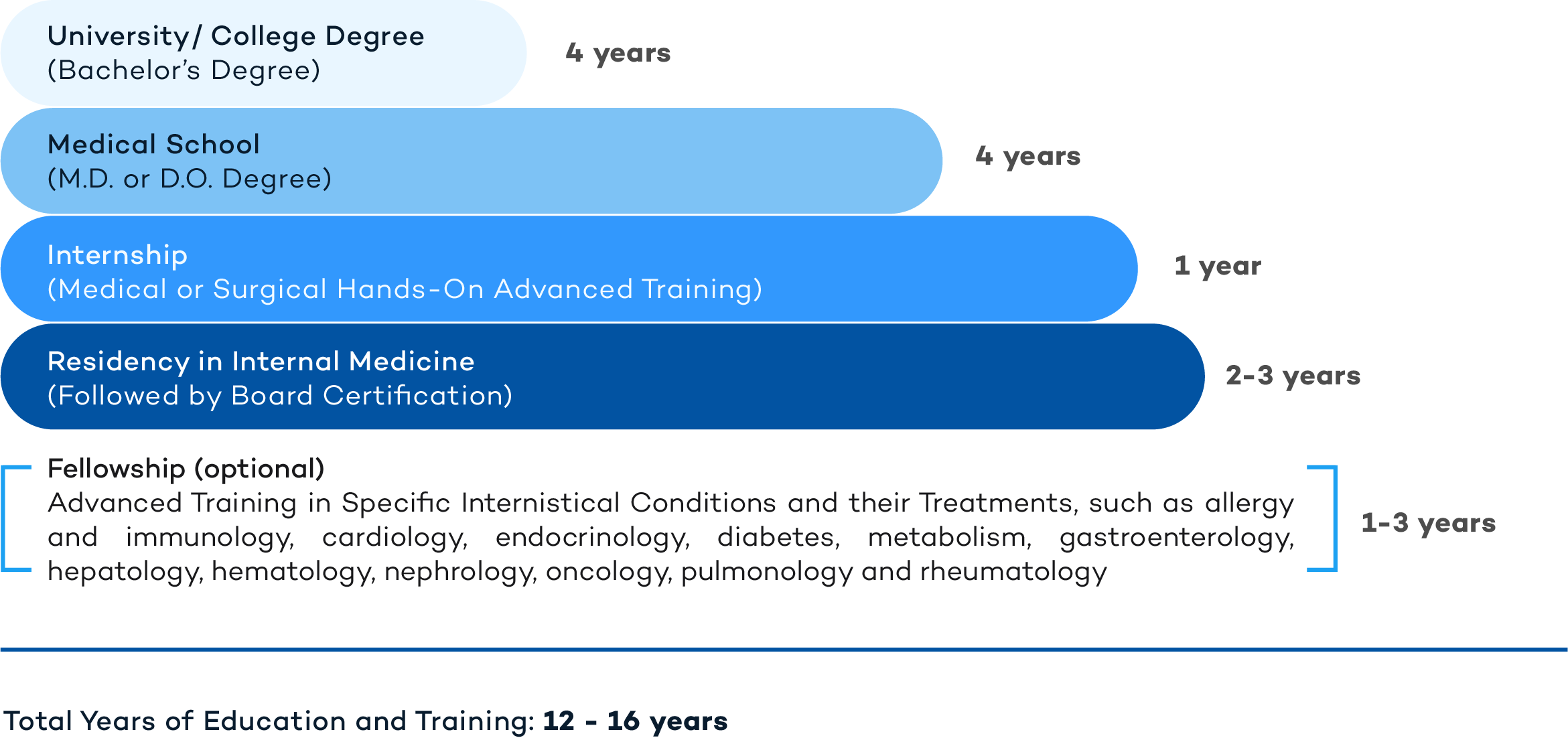

An Internist is a Board-Certified Doctor in Internal Medicine. Internists are able to treat and manage a broad and complete range of diseases that affect adults, pertaining to all of the body's major organ systems. They practice ‘General Internal Medicine’ and are known as ‘General Internists’. They are recognized as experts in the diagnosis and treatment of chronic illness, health promotion and disease prevention. Internists are also skilled to diagnose and handle acute illness, particularly in circumstances where more than one illness is present.
Internists may function as primary care physicians and you may always do your diligence to check the credentials and practice style of the doctor you choose by checking their history and what patients have to say about their expertise. At myDoqter, you have access to patients’ feedback about doctors, and you can also see the professional recommendations given by other physicians who have witnessed first-hand the expertise and professional competency of your doctor.
Internist are doctors (M.D. or D.O.) with advanced medical degrees and training. The following is a representation of the years of education and training that an Internal Medicine physician has undergone.

INTERN from Latin word ‘internus’ for ‘within or internal’ derived from internal medicine designation + IST from the Latin word ‘ista’ meaning ‘one who does or makes’. Therefore, the Internist is the Doctor that handles all internal medicine conditions affecting adults.
The Internist will treat an extensive list of adult acute and chronic conditions, including:
Acute respiratory infections: Infections involving the upper respiratory tract (ears, nose, throat, and sinuses) or lower respiratory tract (trachea, bronchial tubes, and lungs), usually caused by viruses or bacteria.
Asthma: A chronic long-term inflammatory disease that narrows airways of the lungs, hardening air movement in and out of your lungs.
Inflammation of the airways: These may be acute (short-term) or chronic (long-term), like acute or chronic bronchitis and many common allergy-related respiratory conditions. It is accompanied by shortness of breath and cough.
Chest pain: Acute, unexpected pain in the chest. This may be the case with a heart attack, but also with conditions like pneumonia (inflammation or infection of the lungs), as well as pericarditis and pleuritis (inflammation or swelling of the membranes that surround the heart and the lungs, respectively, and which is often caused by viruses).
Diabetes: A disease where there characterized by high blood sugar levels due to poor or inefficient regulation by the insulin hormone. If untreated, diabetes can lead to blindness, skin ulcers, neuropathies and loss in skin sensation, poor healing, and greater susceptibility of infections, among other.
Fatigue: Persistent lack of energy or sudden tiredness.
High blood cholesterol and triglycerides: These disorders are associated with lipid (fatty substances) in the blood stream, and could eventually build up and cause hardening of the blood vessels of the heart (atherosclerosis).
Hypertension: Also known as high blood pressure. It is important to maintain a lifestyle that prevents worsening of high blood pressure, such as reducing stress and high-salt meals. If uncontrolled, hypertension may lead to acute or sudden events like stroke and even heart attack. Long-term complications of high blood pressure include kidney disease and even kidney failure requiring dialysis. Hypertension can also lead to heart failure, pulmonary edema, shortness of breath, and generalized edema and swelling of the body.
Hypothyroidism: Takes place when the thyroid gland is not able to produce enough thyroid hormone. The cause may be auto-immune or due to a virus. Symptoms include: fatigue, loss mental acuity or sharpness, feeling cold easily, weight gain, depression, hair loss, dry skin and brittle nails.
Influenza: Also known as “flu”, is a respiratory illness that results from a viral infection affecting the upper respiratory tract, and most importantly the lungs. It can lead to pneumonia and significant lung inflammation and infection.
Menopause: Natural decline in the production of reproductive hormones estrogen and progesterone, accompanied by the loss of menstrual cycles. A number of symptoms can be quite significant during menopause, such as: hot flashes, fatigue, difficulty sleeping, sadness, depression and a gradual loss in muscle mass and bone density. Doctors can help successfully manage many of these symptoms, and even help reduce the long-term effects of menopause.
Migraine and Other Severe Headaches: Acute persistent headache which may cause nausea, vomiting, and extreme sensitivity to light and sound. Triggering factors often include stress, hormonal changes, certain foods and exposure to a bright light source. In some instances, however, severe headaches could be related to an underlying brain mass or tumor.
Arthritis: Inflammation of the joints on the extremities, but can also affect the back or spinal area. Symptoms may include aching, inflammation, diminished mobility, and rigidity. Types of arthritis could be: rheumatoid, psoriatic or general osteoarthritis with worsening over time and with age.
Osteoporosis: Bone loss disease where the density and quality of the bone are reduced, and the bone becomes porous and fragile. At this point, the risk of fracture from any fall can be significant. Osteoporosis is one of the most important changes that happen with menopause. This makes fall prevention extremely important as female patients get to more advanced age.
Pneumonia: A lung infection commonly caused infectious agents such as bacteria, viruses or fungi. But recently also chemical agents such as those released during vaping have shown to lead to significant lung inflammation, called chemical pneumonia. In general, pneumonia is given by swelling in air sacs in one or both lungs, which may fill with fluid or pus, and significantly compromise breathing.
Ultimately, Prevention and Good Overall Health are the most important steps towards maintaining the heath of your body, as well as preserving the functionality of your organs.
When you visit your Internal Medicine Physician, you will also receive important information regarding how best to prevent general common conditions. Important topics include:
Your Internist will offer a wide range of treatment choices for your conditions and will work with you to find the best choices for your body and your specific condition. Make sure to discuss all these options and other preventive measures with your physician.
You can read more about Internal Medicine in the following links:
https://www.acponline.org/about-acp/about-internal-medicine
https://www.ama-assn.org/specialty/internal-medicine
https://www.sgim.org/career-center/proudtobegim/learn-about-gim